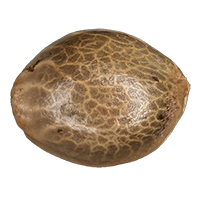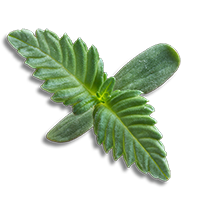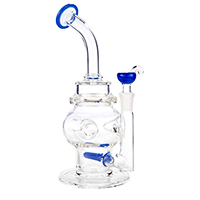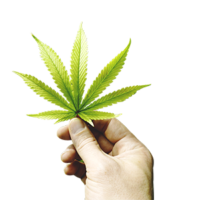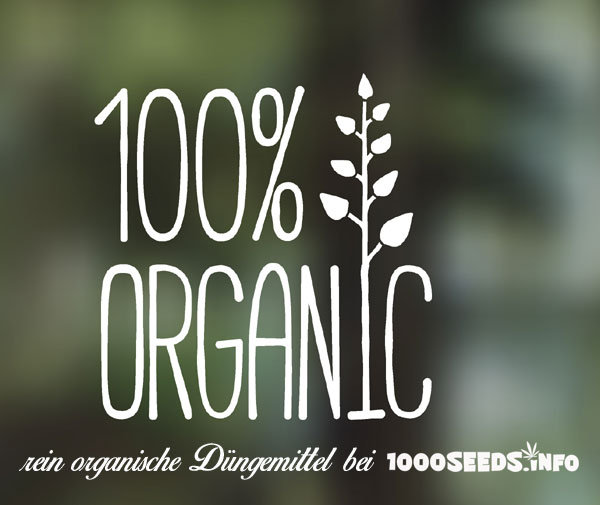Organic fertilisers and additives in cannabis cultivation
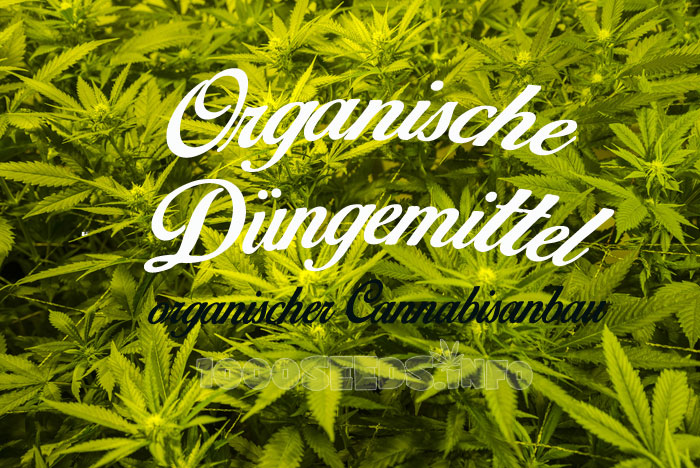
The following are the most important organic fertilisers for cannabis cultivation or other crops.
Alfalfa flour
- Alfalfa meal has 2.5% nitrogen, 5% phosphorus and approx. 2% potassium carbonate
- Use: in compost teas, as mulch, mix into the soil around the plant, use in your own organic soil mixes.
Alfalfa is a plant used for green manuring. Alfalfa meal contains small amounts of phosphorus, potassium and nitrogen. The meal is made from the ground leaves and stems of the plant and is a significant source of nitrogen in the soil. When the alfalfa meal has decomposed in the soil, it releases small amounts of phosphorus, potassium and important micronutrients. It is high in vitamin A, riboflavin, pantothenic acid, niacin, pyridoxine, choline, proline, bentaine, folic acid, thiamine, Ca, Mg, and other valuable minerals.
It also contains important key sugars, starch, proteins, co-enzymes, fibre, 16 amino acids and triacontanol, a natural fatty acid growth stimulant.
Alfalfal meal is a good source of nitrogen and an alternative to blood meal. Its potassium and phosphorus content is nicely balanced. Its carbohydrates and proteins make the organic additive an ideal soil conditioner at the same time, stimulating microbial activities in the soil. The organic fertiliser is broken down with the help of microbacteria and this generates heat. The breakdown and provision of important minerals is thus accelerated.
The activities of the rhizobacteria contained help to dissolve further nutrients and make them readily available to the plant.
Algae meal/algae powder
Algae are fished from the sea or collected from the beach, then washed, dried and ground into algae powder. It contains many trace elements, amino acids, plant hormones and vitamins that are already chelated, i.e. water-soluble and quickly available. If the plant is severely nutrient deficient, an aqueous solution and quick cure with algae can help quickly. The nutrient content of an algae preparation depends on the type of algae used and its origin. Algae powder can be quickly absorbed by the plant, positively influences the microorganisms in the soil and protects marijuana plants from diseases.
- e.g. Tresal gas from Trabe, consists of three different types of algae
Blood-meal,/Blood-meal
Blood meal is an animal product from the slaughterhouse. Although it is a wonderful organic fertiliser, it may transmit certain animal pathogens and you should not fertilise your buds with the blood of other living creatures, it does not suit the plant. Blood-Meal is made from blood and processed into powder. It is rich in nitrogen (12-15%) and contains about 1% phosphorus. It has the highest nitrogen content of the organic fertilisers.
Cottonseed meal
Cottonseed meal is an acid fertiliser containing 7% nitrogen, 2.5% phosphorus and 1.5% potassium carbonate. It should be used together with seaweed and bone meal to ensure a balanced nutrient supply for the plants.
Bat Guano /Guano
- N = 3, P = 10, K = 1
Bat guano /Guano consists of the excrements of bats and contains a lot of soluble nitrogen, phosphorus and trace elements. Guano is a very good flowering fertiliser, usually available in powder form. It can be used outdoors or indoors at any time of the year and is sprinkled on the soil around the plants or added to a compost tea (i.e. in liquid form).
Seabird Guano
- N = 1, P = 4, K = 1
- Sea Bird Guano from Top Crop
Seabird guano has a high nitrogen content and many other nutrients. Seabird guano is scraped from rocks on the coast all over the world and can thus have a different composition and nutrient content depending on its origin.
Bone meal
Bone meal is an animal product that, as the name suggests, is made from bones. It contains high levels of phosphorus and nitrogen. Bone meal in combination with other organic fertilisers gives very good results and also improves the soil condition. Because of the risk of possible transmissible diseases from this animal waste, I personally advise against using bone meal for indoor cultivation and in general. If you have organic and environmentally friendly cultivation in mind, the use of products and waste products from factory farming also makes little sense in my opinion.
Compost/compost soil
As every gardener knows, compost is a type of soil additive made from decayed and decomposed organic matter. Compost contains numerous nutrients and auxiliary substances for the plants and is used by many growers as the only fertiliser, especially outdoors. Compost enriches the substrate (soil) and ensures excellent yields.
The so-called compost teas are liquid, decomposed organic substances with a high nutrient content, liquid compost so to speak.
Compost can either be made in your own garden or purchased ready-made from us, e.g. from Plagron or Top Crop.
Dolomite lime
- 50% calcium, 40% magnesium
Dolomite lime regulates and balances the ph-value of the soil. It is usually added to deacidify the soil (pH value is raised) and contains calcium and magnesium, among other things. Dolomite lime is mainly used as a secondary nutrient supplier.
Fishmeal
- Use: best incorporated into the compost or soil mix several months in advance.
Fish meal is made from dried fish that is pulverised. It is rich in nitrogen (about 8%) and contains about 7% phosphoric acid as well as a lot of trace elements. However, the smell of fishmeal is an issue in itself and is extremely intense. Therefore, fishmeal is not really recommended for indoor use. It is an excellent compost activator. To control the smell, it can be covered with soil or mulch after sprinkling on the soil around the plant. It should be kept in an airtight container to avoid attracting flies or other vermin. Fish meal can contain up to 10% nitrogen. The liquid form of fish fertiliser usually contains less nitrogen than the powder form.
Goat dung
Goat manure, is similar to horse manure but even more potent. It should first be composted well and then mixed into the substrate. Hot composting is particularly recommended for goat dung, which destroys many pathogens and destroys the germination capacity of the grass seeds it contains. Goat dung often contains many weed seeds. Therefore, hot composting is especially interesting for indoor cultivation, where the marijuana gardener does not want to grow weeds in his grow box, but would rather secure the space for the cannabis plants.
Granite flour/stone powder
Granite meal/stone powder contains up to 5% potassium carbonate and several trace elements. It releases nutrients slowly over several years. Granite dust is a cheap source of potassium carbonate and does not affect the ph-value of the soil. It usually works too slowly for indoor use and is therefore more common for outdoor growing.
Horn meal
Horn meal is an excellent resource for the slow release of nutrients. Finely ground horn meal makes the nitrogenous substances more quickly accessible. The microorganisms in the soil must first break down and decompose the horn meal before it can be taken up by the roots in the form of usable nutrients. It is therefore advisable to work the horn meal into the soil 2-3 weeks before planting. It remains in the soil for about 6 months. Horn meal contains between 6-15% nitrogen and about 2% phosphoric acid.
Horse manure
Horse manure should first be composted sufficiently and completely before it is fed to the plants, because the composting process can kill grass seeds (especially with hot composting) and furthermore the nutrients are then usable for the plants. Horse manure contains N (0.6%) - P (0.6%) - K (0.4%) and is rich in important trace elements.
Seaweed
Seaweed contains 60-70 minerals that are already chelated and can be absorbed immediately by the plant.
Seaweed
Seaweed, like kelp, is rich in potassium carbonate, trace elements, vitamins, amino acids and plant hormones. The nutrient content can vary depending on the origin and type of seaweed. Seaweed meal can be very easily absorbed by plants, it promotes healthy soil cultures and improves soil structure. In addition, seagrass makes the plants more resistant to diseases.
Rabbit dung
Rabbit manure is excellent for fertilising cannabis plants. The rabbit manure should be composted sufficiently and completely beforehand, like any manure, especially if you want to use it indoors
Sheep dung
Sheep dung contains many important nutrients: N (8.8%) - P (0.5%) - K (0.4%) and numerous trace elements. Sheep dung contains little water and a lot of air.
Worm dung
- N = 0.5 P = 0.5 K = 0.3
Worm dung consists of the excreta of worms. It is an extremely rich compost that contains a lot of nitrogen and other nutrients. It contains 11 trace elements and is also good for seedlings because it cannot burn them. Worm manure does not need to be composted because it is already a form of compost.
It also improves the soil structure and supports the microorganisms in the soil. No more than 20% worm manure should be added to any mix.
Nettle
Nettle decoction is a real powerhouse for cannabis plants. The nettle or the decoction is rich in nutrients, trace elements, vitamins and many other important substances for the plants. It gives the plants resistance and strong growth. Here you will find a recipe for a liquid, composted Recipe with nettle.
Freshly cut nettles are also a valuable addition to any compost.
Notes on the use of organic additives:
- The nutrient content of organic fertilisers can vary greatly depending on origin, age, decomposition, climate, etc. However, organic fertilisers can normally not be over-fertilised nearly as easily as chemical mineral fertilisers. Organic fertilisers are primarily absorbed by the plant only in the quantity in which they are really needed.
- The exclusive use of organic fertilisers indoors requires some knowledge and also some adaptation of the planters. Basically, large to preferably very large planters with good drainage should always be used to allow the necessary microbiological soil climate. This requires some space in the root area. If it is possible to build an indoor raised bed, this should be considered. This is the best option for organic cultivation because the microbiological life in the soil can develop best here, so this is most similar to the outdoors. The indoor raised bed should be at least 1m high so that it works well.
- Infusions and "fertiliser teas" with organic additives also work very well indoors, but can sometimes be difficult to use due to odours. Compost from dung or manure should not be used indoors at all, but is an excellent fertiliser for outdoors or compost made from it. Guano is an exception and is also very suitable for indoor cultivation.


